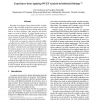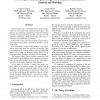935 search results - page 71 / 187 » From Logic Programming Towards Multi-Agent Systems |
CLIMA
2007
13 years 11 months ago
2007
Abstract. Failures are unavoidable in many circumstances. For example, an agent may fail at some point to perform a task in a dynamic environment. Robust systems typically have mec...
ISORC
2007
IEEE
14 years 4 months ago
2007
IEEE
Knowing the program timing characteristics is fundamental to the successful design and execution of real-time systems. Today, measurement-based timing analysis tools such as in-ci...
BMCBI
2004
13 years 9 months ago
2004
Background: Recent technological advances in high-throughput data collection allow for experimental study of increasingly complex systems on the scale of the whole cellular genome...
FSKD
2007
Springer
14 years 1 months ago
2007
Springer
The uncertainty may be divides it into two major groups, "objective uncertainty" and "subjective uncertainty". The objective uncertainty has already been exten...
CORR
2011
Springer
13 years 1 months ago
2011
Springer
The probability theory is a well-studied branch of mathematics, in order to carry out formal reasoning about probability. Thus, it is important to have a logic, both for computati...


